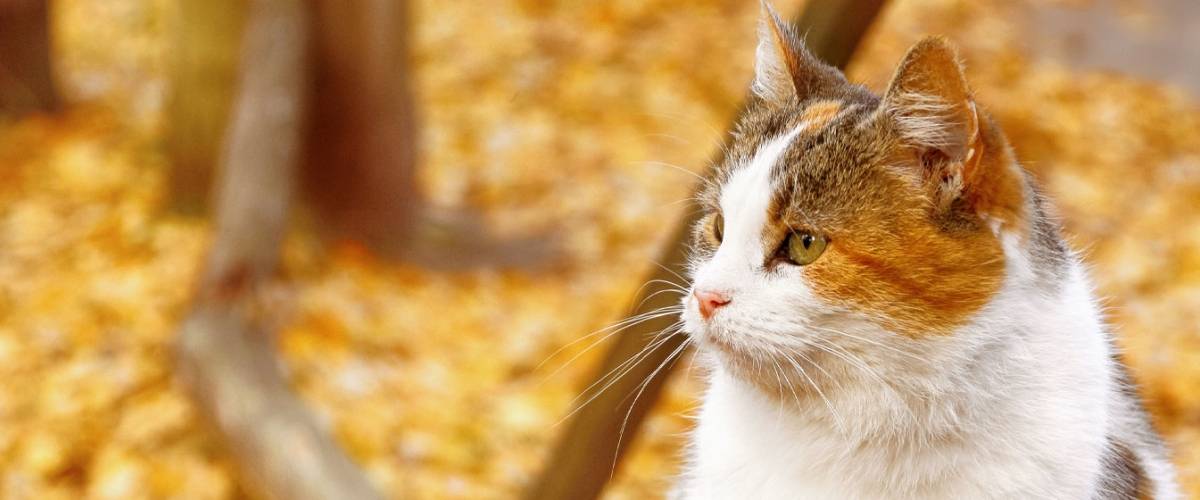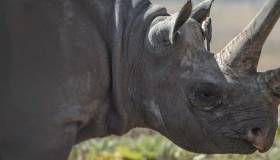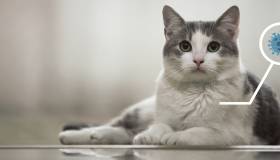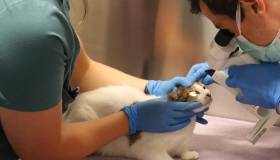
DENVER/November 21, 2019 – Could an oral vaccine protect cats from a common virus guilty of mutating and causing feline infectious peritonitis, a fatal disease in cats? Morris Animal Foundation-funded researchers at Colorado State University are constructing a vaccine for that virus, feline enteric coronavirus, which can mutate into FIP virus. If successful, the vaccine will control pervasive FECV infection in shelters and other multi-cat environments, while also protecting individual cats against FIP.
“For years, we have tried, unsuccessfully, to vaccinate against FIP, but we may have been targeting the wrong point in time,” said Dr. Gregg Dean, Professor and Head of the Department of Microbiology, Immunology and Pathology in CSU’s College of Veterinary Medicine and Biomedical Sciences. “Our strategy now is to eliminate FECV, the mild-mannered Dr. Jekyll form, if you will, before it can become the deadly Mr. Hyde.”
Feline enteric coronavirus is a common intestinal virus that most cats are exposed to and infected by at some time in their life. FECV is highly contagious and transmitted easily through saliva or feces. Very few cats show any symptoms and most recover uneventfully.
The virus can, however, randomly mutate and cause FIP, one of the deadliest infectious diseases of domestic cats. It manifests in two different forms, but both include symptoms of fever, weight loss and lethargy, affects multiple organs, and causes inflammation of the blood vessels. While it’s estimated that only 5% to 10% of infected cats develop FIP, it is 100% fatal. FIP is difficult to diagnose, and effective treatments are not currently available.
“We’ve had remarkable success in addressing many other infectious diseases in cats, but FIP is one notable exception and it can be particularly devastating as it claims them so young,” said Dr. Janet Patterson-Kane, Morris Animal Foundation Chief Scientific Officer. “If we can control the disease in large groups of cats that would be a wonderful thing.”
The team’s vaccine design will include the bacteria Lactobacillus acidophilus, a probiotic found in foods like yogurt and cheese and already present in many animals’ gastrointestinal tracts. The vaccine will deliver specific FECV proteins to naturally stimulate cats’ immune systems to protect against infection by FECV.
The team will test the vaccine in a defined population which already has endemic FECV, with 12 kittens in a control group and 12 given the vaccine. Kittens given the vaccine will then be tested to see if they are positive or negative for FECV.
The vaccine is designed to be given orally, rather than injected, for several reasons. First, oral vaccines are preferred by cats and their owners. Oral vaccination also avoids the risk of injection site sarcoma, a rare malignant tumor that can arise at an injection site. Most importantly, since FECV infects the intestinal tract, vaccines that are ingested may be more effective.
Feline infectious peritonitis targets kittens and young cats under 2 years of age. At highest risk are cats that live in close proximity to each other, such as cats that live in shelters, where FIP is five to 10 times more prevalent.
Dr. Dean also is leading a second Foundation-funded study to develop a new diagnostic test for FIP. It would be minimally invasive and easy to use in a clinical setting, requiring just a blood sample. His team has identified 18 proteins, among thousands, that appear to be common in cats with the disease. The team aims to prove the proteins are indeed markers for FIP and determine which ones can be detected easily and developed into a diagnostic test.
Morris Animal Foundation, headquartered in Denver, is one of the largest nonprofit animal health research organizations in the world, funding more than $155 million in studies across a broad range of species.
About Morris Animal Foundation
Morris Animal Foundation’s mission is to bridge science and resources to advance the health of animals. Founded by a veterinarian in 1948, we fund and conduct critical health studies for the benefit of all animals. Learn more at morrisanimalfoundation.org.




